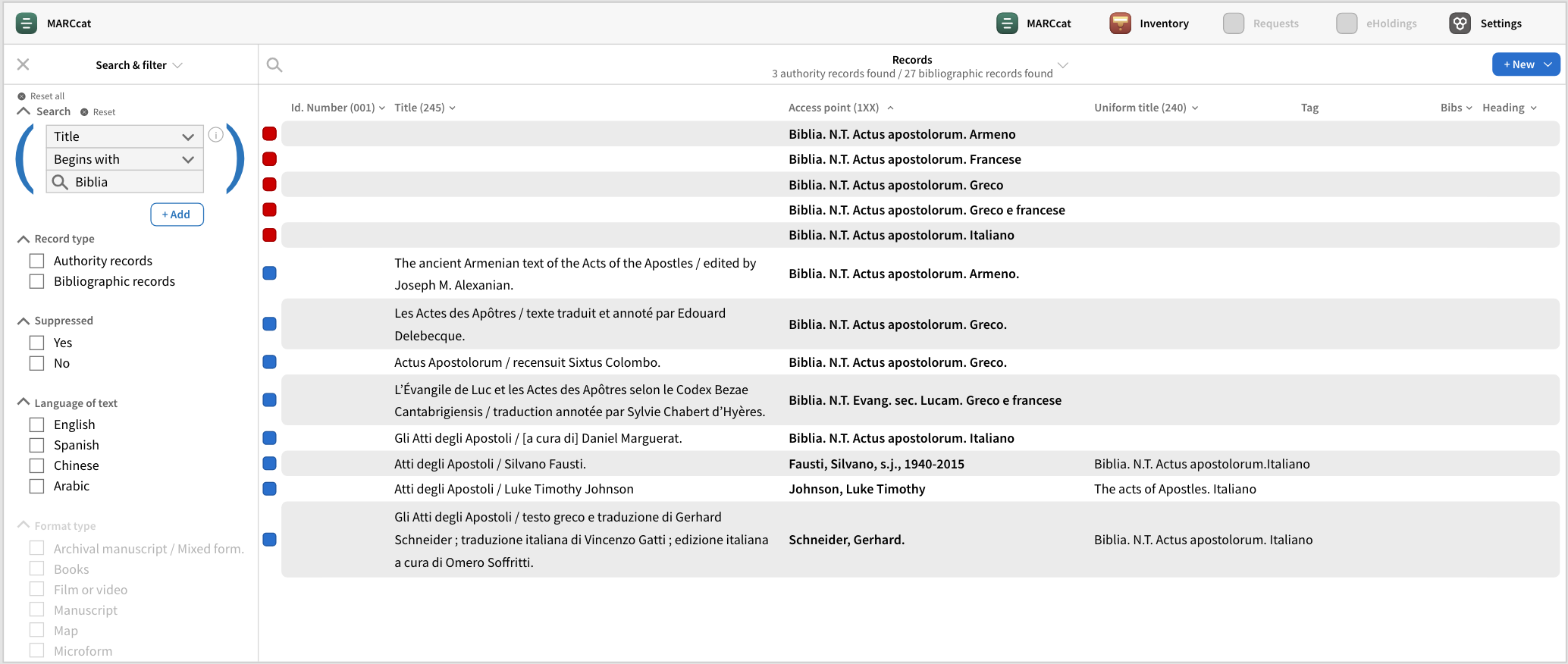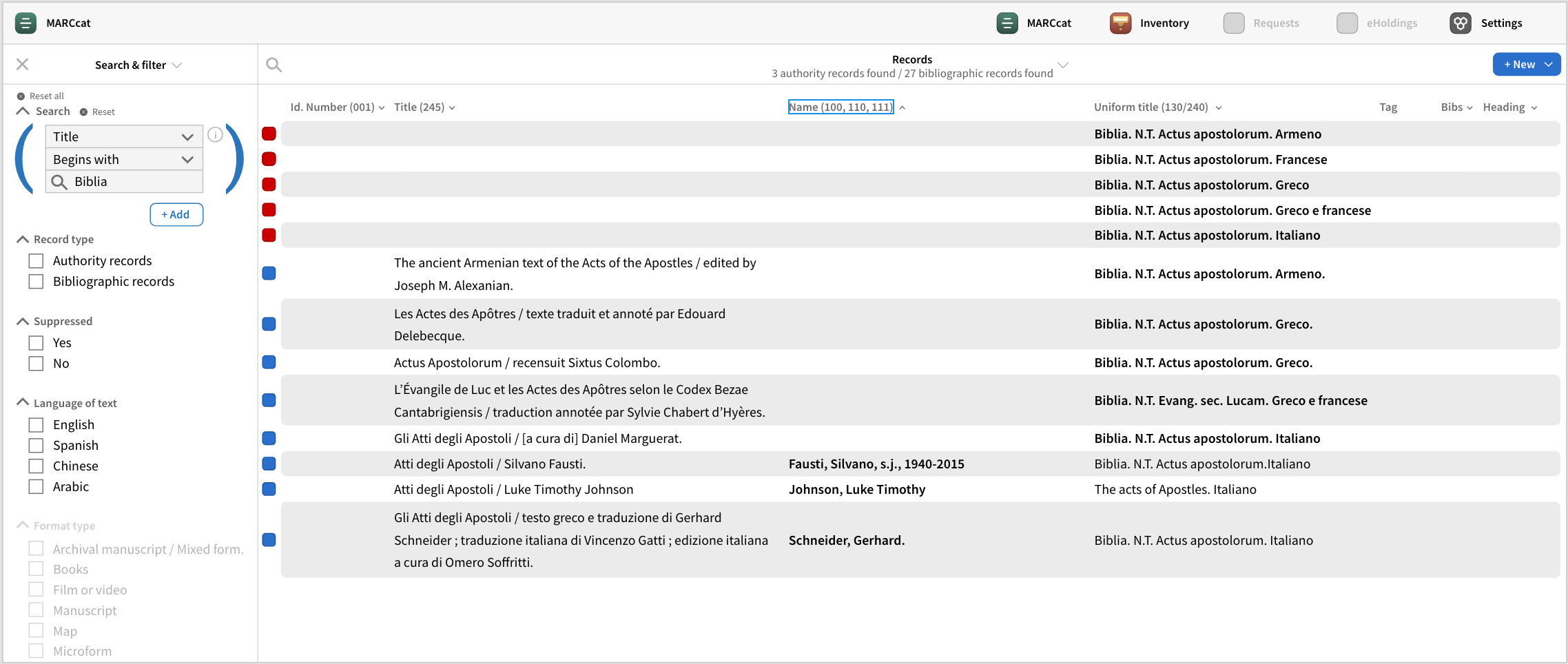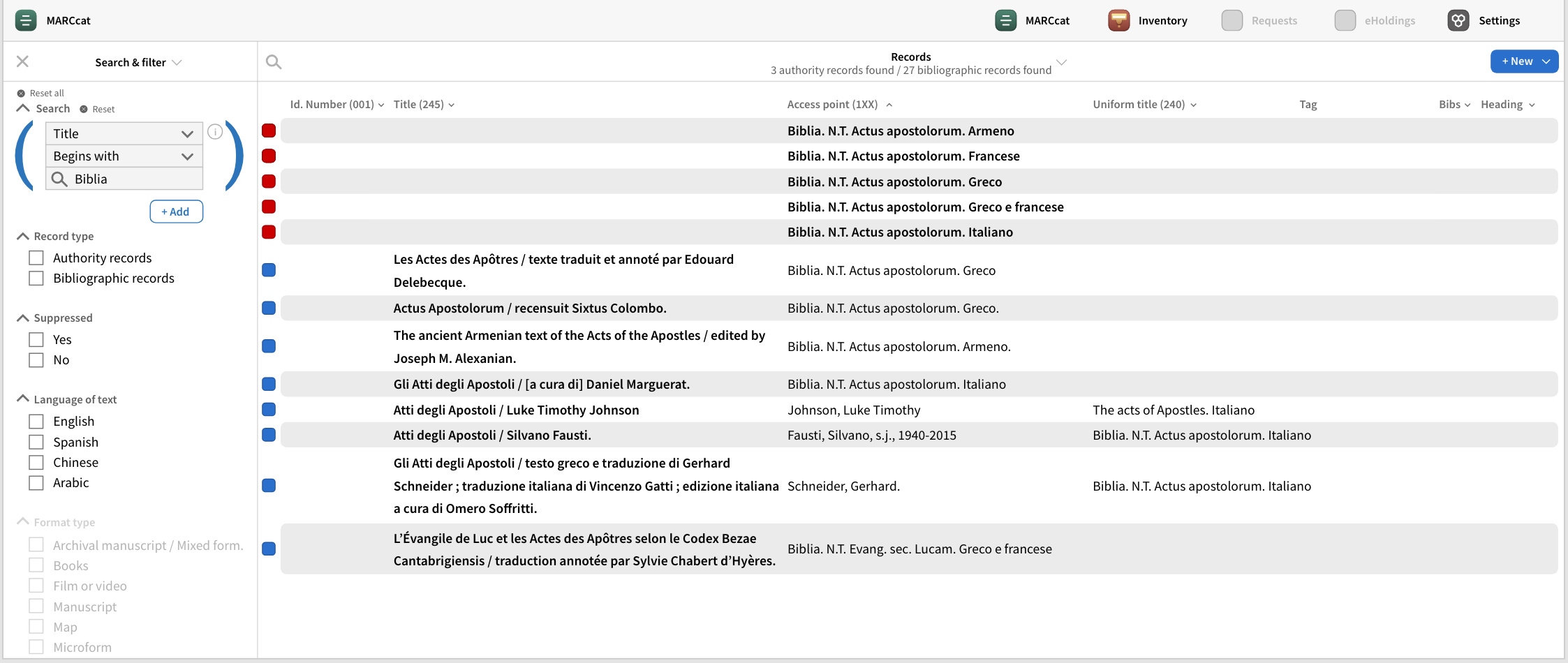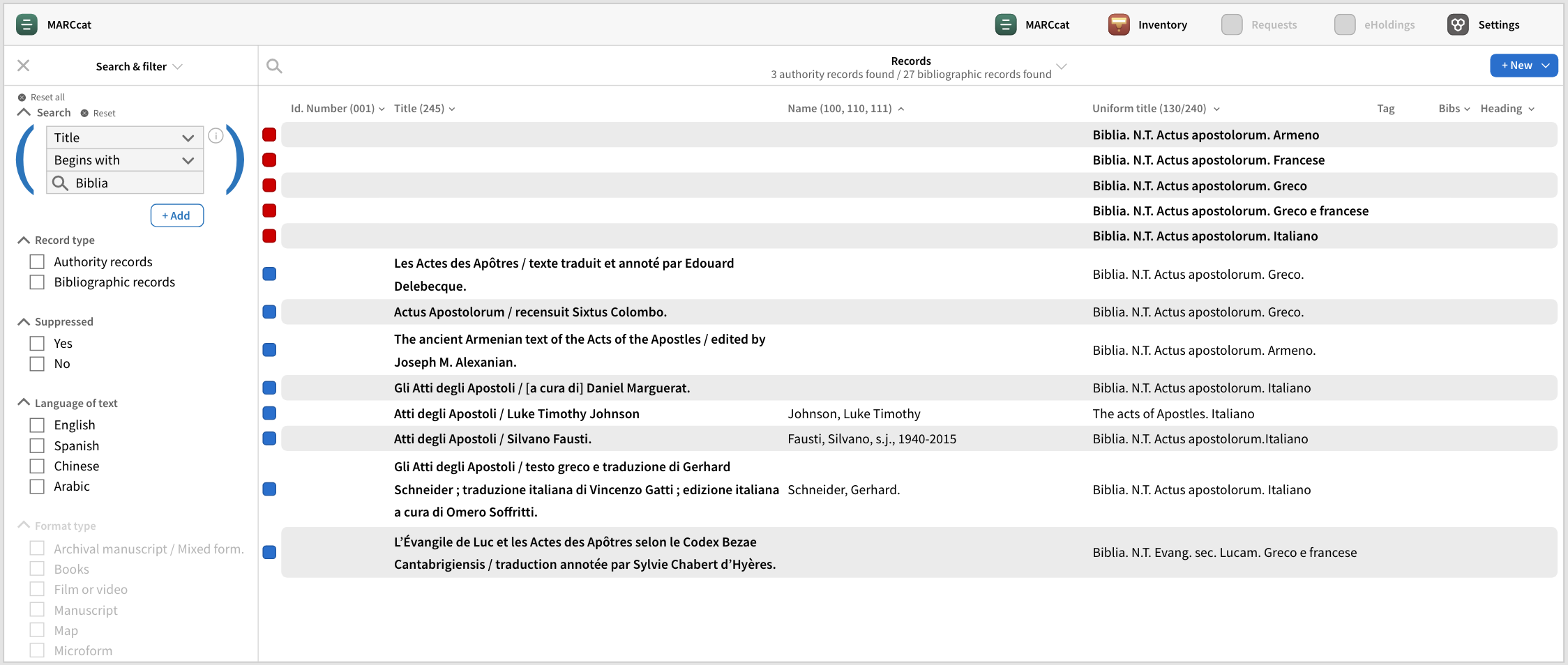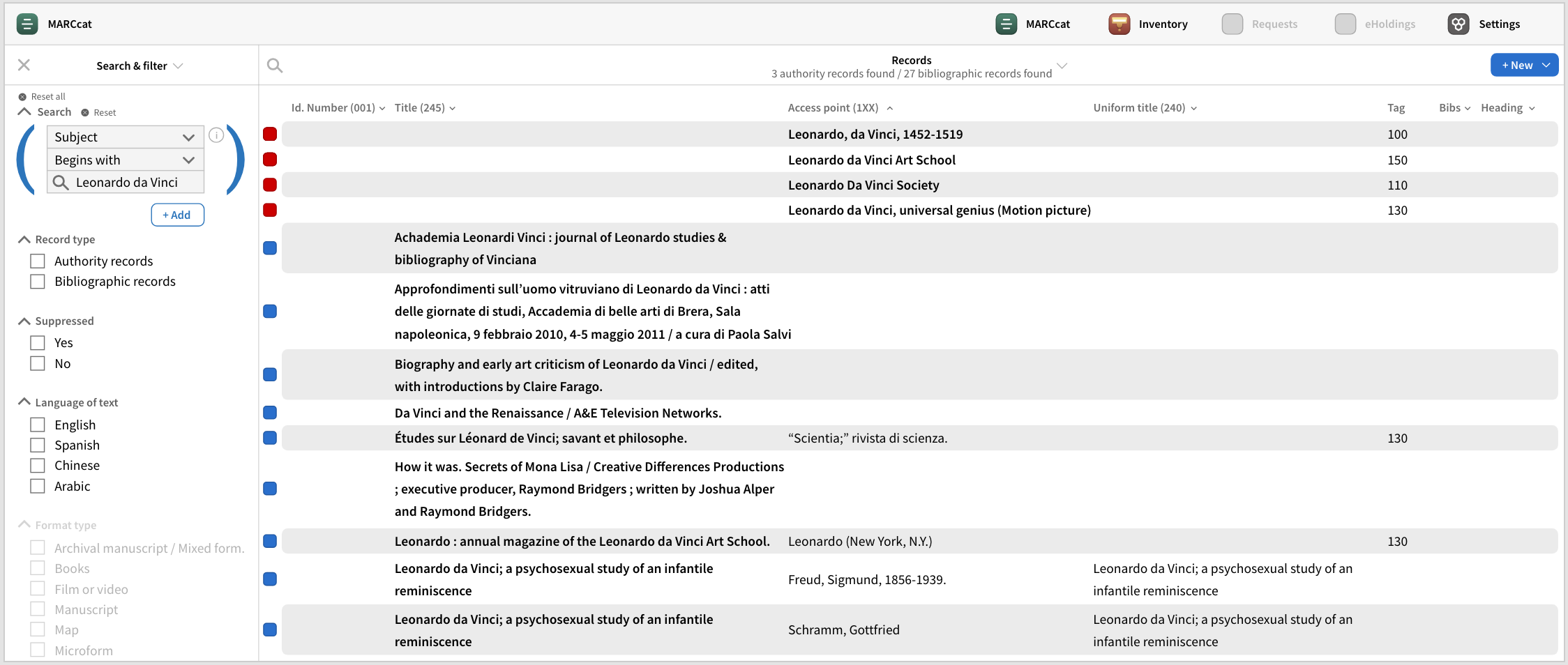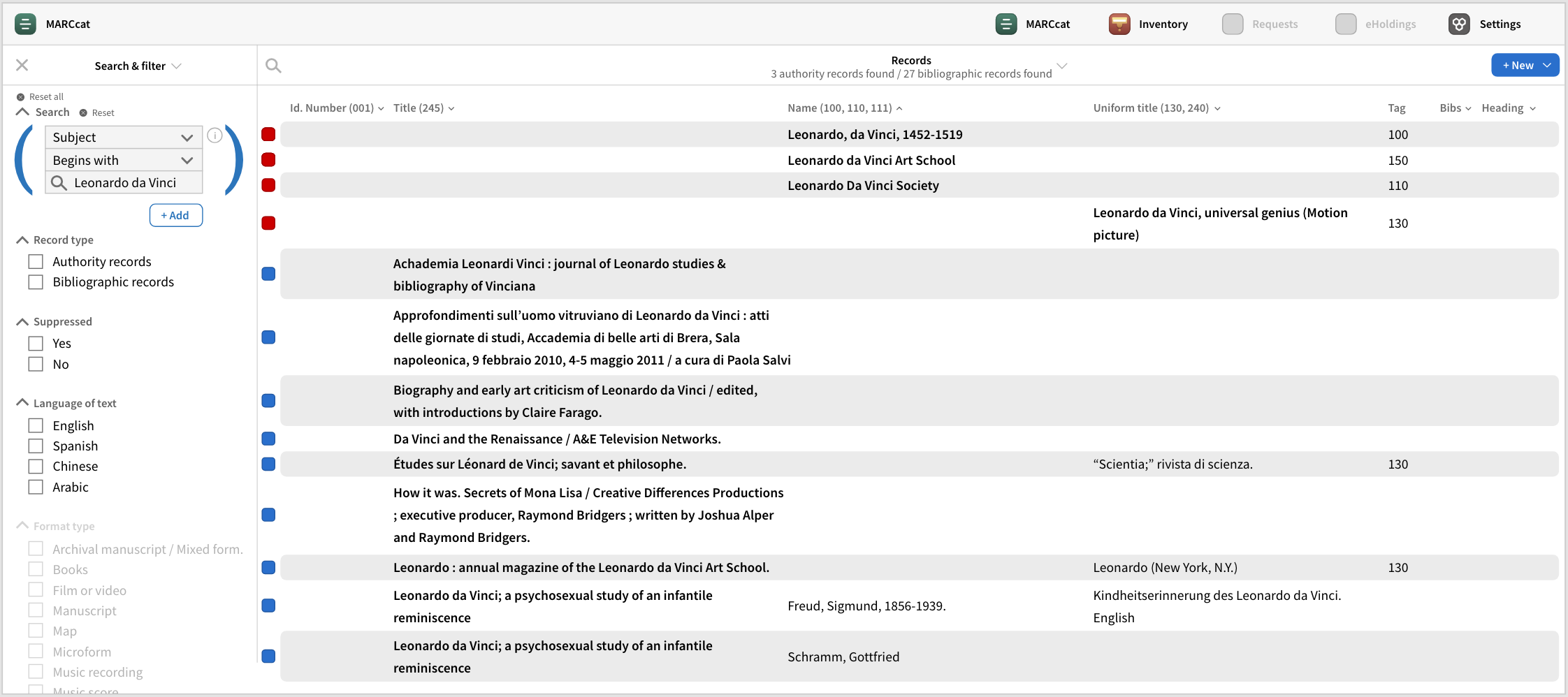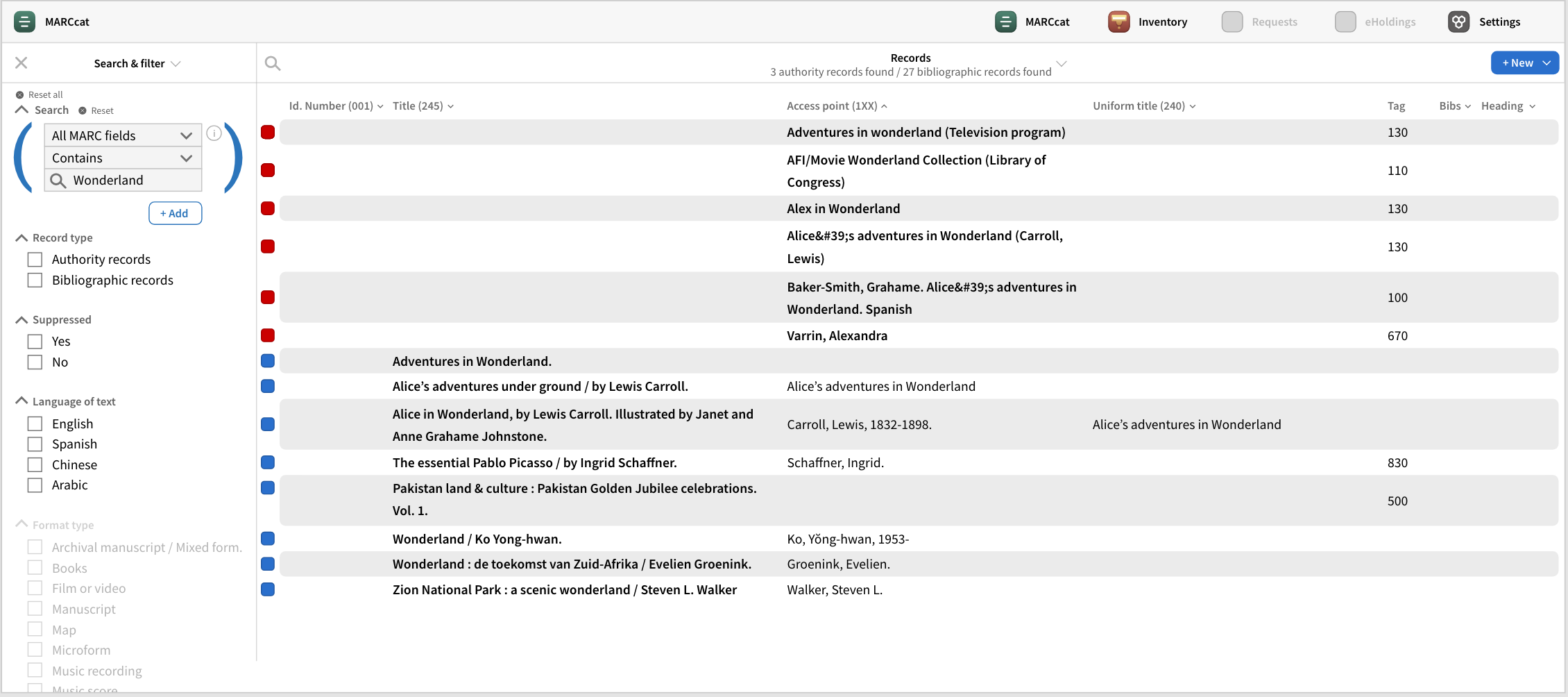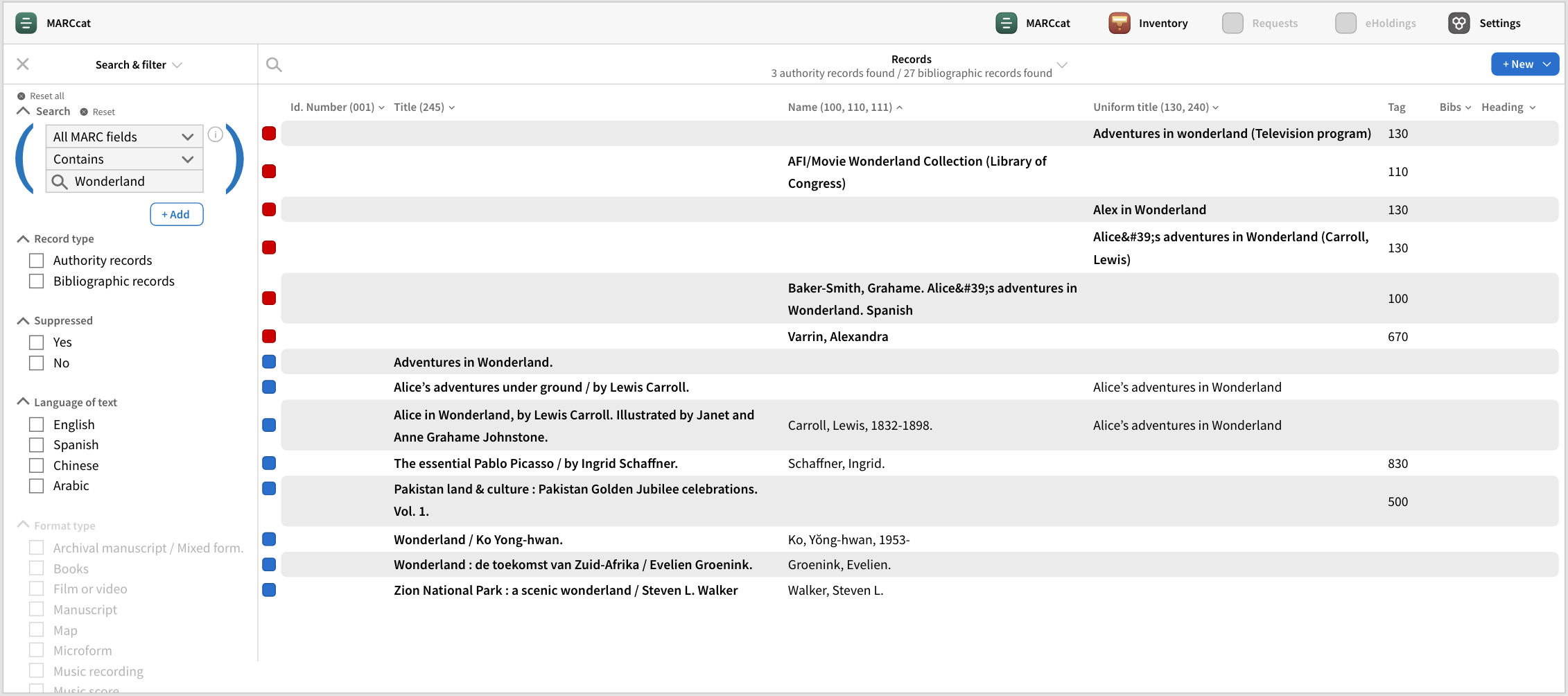2018-11-19 MARCcat Subgroup Meeting Notes
Date
Recording is available on: https://drive.google.com/file/d/1bgAHVwH0lqQjr4qvKqJdwJzQiezupcxF/view?usp=sharing
Link to the zoom-meeting: https://zoom.us/j/789583408
Link to the wireframes:
Link to the discussed document:
Discussion items
Item | Who | Notes |
|---|---|---|
| Notes | ||
| MARCcat UX/UI analysis |
| |
| Examples |
Please write your comments/preferences in the space provided below the screenshots. Click on the image to see a larger view.
- Title Search Results - Default order by Access Point
| TI BIBLIA, default order on ACCESS POINT, two columns for: Access point (1XX) and Uniform title (240) | TI BIBLIA, default order on ACCESS POINT, two columns for: Name (100, 110, 111) and Uniform title (130, 240) |
|---|---|
Comments: | Comments: |
@Cult: •Search for Title «Biblia» and default order in AUTH and BIB for Access point. •Tag 130 is included in column «Access point». In the column «Uniform title» is displayed tag 240 of bibliographic record. | @Cult: •Search for Title «Biblia» and default order in AUTH and BIB for Access point. •Tag 130 is not included in column «Access point». In the column «Uniform title» you have both tag 130 and tag 240 (in case of bibliographic record with author, of course the uniform title displayed in column «Uniform title» is coming from tag 240). |
Sarah Ross: I'm confused. (Sarah here). First–am I right here?–this is not a "Browse" search, which would interfile the bib and authority records–right? @Cult: yes, it's right: this is a search result summary, not a Browse result. So we're looking at the AUT + BIB search as you say. But how is "Title" defined? I am puzzled at why titles used as 630s are being retrieved as in the book by Fausti. In the "Groupings" settings page, I would not include the 630 as part of the title search–I would expect to perform that search as a subject search. @Cult: we don't consider here the tag 630 in the 'title' category... The Title here comes (for Bib) from 245, 130, 240, 246 (we already have the list of tags for this 'Title'). For AUTH, Title comes from tag 130. Why are you referring to tag 630? Probably we misunderstood your note... In the Fausti example, it's not possible for "Biblia. N.T. Actus apostolorum. Italiano" to be in the 240. It's not even the 240 of the name/title authority record used as a subject. It's just a 630. If we were searching on a title as a subject, we'd like to see the whole string in a column called Subject. @Cult: sorry, you are right but only because the original record used as example is 'wrong' (from a cataloging view point): the cataloguer should record the heading "Biblia. N.T. Actus apostolorum. Italiano" in a subject tag, not as title (240). In any case, the example is used to show (in any case) the order criteria (don't consider, please, the wrong record included in the list, but just the 'visual' and functional effect in order record using this criteria. | Sarah Ross: Although this display has the same problem of conflating the 130 with the 240, I find it somewhat less confusing, although I still have to remind myself that sometimes the entry is for a title and sometimes it is for a title-as-subject. @Cult: thanks Sarah, but see, please, the previous explanation (the wrong record included in the examples). So, no subject tags (6xx) are really used as title in this function. |
Jacquie Samples: I agree that the titles in a 630 tag are not what I would want to see in a title search. Or rather, it is not what I expect to see currently. So, I wouldn't include 630 data in the results of this search as a default, but I would want to be able to add fields to the results (as an institution), in case there are local fields and preferences, etc. If the 630 is not used as a source for a title search results list, then that is fine with Duke. @Cult: yes Jacquie Samples, as explained before, the record included in the example (that generated this confusion) is wrong from a cataloguing view point (sorry, we usually use database for test, where records are not controlled). | Jennifer Eustis: Having looked at both of these a number of times, I prefer this view where there is Name and then uniform title. It could be that this is just the types of view that I'm used to seeing. In any case, I find it easier with this type of division. Jacquie Samples: I agree with Jennifer that the view with Name, then Preferred title looks better. I also want to suggest that we use Preferred title instead of Uniform Title, a la RDA. @Cult, we absolutely agree with this. Jennifer Eustis: I like the suggestion Jacquie Samples of using preferred title if we have both the 130/240 in a column. |
Lisa McColl: I feel like I have gotten behind on this conversation, so please excuse me if this suggestion was already decided against: I would expect this search to search the 245 field and show me results from in the 245 field, with only titles that begin with "Biblia", in alphabetical order. Example search result (these are all titles from a 245 field): >Biblia excrementa So, when searching by Title I suppose I think one should only have the choice to search bibliographic records, not authority. If a user wants to search uniform titles, that should be a separate option. In that case it makes sense to be able to select bibliographic and / or authority for the results. There really needs to be an option to search titles as they appear in the 245 field and have the search results display in alphabetical order, starting with the word searched ("begins with). @Cult: we try to discuss this topic during our meeting. |
2. Title Search Results - Default Order by Title
TI BIBLIA, default order on Title (245 BIB – 130 AUTH), two | TI BIBLIA, default order on Title (245 BIB – 130 AUTH), two |
|---|---|
| Comments: | Comments: |
| @Cult: •Search for Title «Biblia» and default order in AUTH and BIB for Title (in case of bibliographic records Title is coming form 245). •Tag 130 is included in column «Access point». In the column «Uniform title» you have only tag 240. | @Cult: •Search for Title «Biblia» and default order in AUTH and BIB for Title (in case of bibliographic records Title is coming form 245) •Tag 130 is not included in column «Access point». In the column «Uniform title» you have both tag 130 and 240 (in case of bibliographic record with author, of course the uniform title displayed in column «Uniform title» is coming from tag 240). |
Sarah Ross: Again–in the Fausti example, that's not a 240 tag. It's a 130, and it's coming from the 630, not a 130 on the bib. @Cult: ok, we agree and see our previous mistake in using a bad record. I find the idea of filing on the TITLE, when you have searched on TITLE, to be the most natural. | Sarah Ross: OK. It's really hard to say because I don't quite understand what is being searched and retrieved, but as far as display goes, this Option 4 seems the cleanest to me. |
3. Subject Search
SU Leonardo da Vinci, default order on Title (245), two | SU Leonardo da Vinci, default order on Title (245), |
|---|---|
| Comments: | Comments: |
@Cult: •Search for Subject «Leonardo da Vinci» and default order in AUTH for Access Point and in BIB for Title (245). •Tag 130 is included in column «Access point». In the column «Uniform title» you have tag 240. | @Cult: •Search for Subject «Leonardo da Vinci» and default order in AUTH for Access Point and in BIB for Title (245). •Tag 130 is not included in column «Access point». In the column «Uniform title» you have both tag 130 and 240. |
Sarah Ross: The Freud examples do not appear to be 240s; they're just the 245 repeated, including subtitle, on $l. @Cult, the example for Freud is wrong (sorry, a wrong copy/paste to propose just an example): see the next example where the same record was re-created correclty. I don't imagine that this would be a search I'd want to perform very often; I need to see the Browse index for this type of work. | |
4. All MARC Fields
AW wonderland, default order on Title (245 BIB), two | AW wonderland, default order on Title (245 BIB), two |
|---|---|
| Comments: | Comments: |
@Cult: •Search for AW «Wonderland» and default order in AUTH for Access Point and in BIB for Title (245). •Tag 130 is included in column «Access point». In the column «Uniform title» you have tag 240. | @Cult: •Search for AW «Wonderland» and default order in AUTH for Access Point and in BIB for Title (245). •Tag 130 is not included in column «Access point». In the column «Uniform title» you have both tag 130 and 240. |
@Cult: It would be better to have a single default order for all types of search, to avoid frustration in the cataloger, otherwise he must keep in mind the different order criteria applied to the search result on the basis of the search done. Moreover consider that these are all simple searches. What will be the order to apply in case of complex query? such as "TI WONDERLAND" AND "AW CARROLL, LEWIS"? (AW is the index for Any keyword). | Sarah Ross: I'm not sure, but jumping between the two side-by-side screens, it seems better to me to include the 130 in the Access Point column, and to leave the 240 alone by itself. |
Sarah Ross: In the fourth authority example, how did Lewis Carroll end up in parenthesis at the end of the 240? Shouldn't he be in the 100 and "Alice in Wonderland" be in the 240? Is not technically possible to deconstruct an authority record in the way a cataloger thinks? (I understand if that is the case). @Cult: don't consider, please, cataloging rules and how they are applied to these examples: we just used a local test db with (probably) a lot of not verified/wrong records... But it's just an example to show the search result list. But then what's going on with Baker-Smith's book? Shouldn't some portion of that title be in the 240? I can't tell if it's a translation of a book of criticism by Baker-Smith or if it's a Spanish translation of Carroll's work. @Cult: this is a Name/Title example in authority record: 100 1# $a Baker-Smith, Grahame. $t Alice's adventures in Wonderland. $l Spanish | |
Sarah Ross: As a general matter, I disagree that we must have a single default order for all types of searches. I promise you I won't feel frustrated if I get results presented differently for different searches. After all, I perform different searches to get different results. However I do understand the desire for consistency. Sarah Ross: In the case of complex searches, catalogers would usually be performing that type of search when they are looking either for a very specific keyword and some filters, or when they want to see the general landscape of our Wonderland holdings. Ordering by 245 title should be good enough, and I like the idea of grouping all the access points 100, 110, 111, and 130 together, and pulling out the 240 to its own column (see example 4B next door). If a cataloger is really trying to clean up our name/title indexes on Wonderland, she should be working with the Browse index. | |
| @Patricia Williams (paw7@uchicago.edu): I have a strong preference for David's lefthand search results screens, the ones where the 130 appears in the same column as the 100, 110, and 111 fields under the label Access point. I don't think it makes sense to separate the 130 into a column with the 240. The 130 tag is a full access point just like the 100, 110 and 111. The 240 is only a portion of an access point and cannot exist without a 1XX field. I think it will be clearer to have all the 1XX tags appearing together in the same column. That way, if a cataloger wants to close the column with the 240 information, he or she can do that without the danger of missing information. Also, keep in mind that others will be using these search screens (copy catalogers, acquisitions staff and others who are not professional catalogers) and we have to be able to explain the rationale for the display. I don't think I'd be able to explain why 130s should be displayed with 240s because it makes no sense to me. I agree with AtCult that the results screens should be consistent with each other regardless of the type of term being searched. Jacquie Samples: I agree with Pat that putting the results from the 130 and 240 in the same column does not make sense. Since all of the 1XX are types of preferred access points, while the 240 is just the uniform title. | Sarah Ross: I'm hesitating over the consistency issue. If I search on a Name, it seems to me that it should not be too much to ask to see the first column be Names by alphabetical order; or titles, for the first column be titles. But obviously a fixed order is also something we can cope with. But what about subject searches, where the subdivisions are so important? If I search on Subject Begins With Leonardo, I don't want to see a list of every book that has a subject heading that starts with Leonardo. I need to see Leonardo–Bibliography, Leonardo–Catalogs, Leonardo–Catalogues raisonnes. And I think that index should be the first column I come to. @Cult: the solution could be to present, as we already discussed some time ago, also the column for subjects, that we can use for order scope. but, if we remember well, the problem in this case is that we can have in the same record different subjects strings: which of them can we use to order the result list? But I don't have a good picture of what real searches would look like, so I don't want to dig in on this point. |
| "I agree with AtCult that the results screens should be consistent with each other regardless of the type of term being searched." ---- I think this is where I'm having a problem and I think we're running into trouble. If you search something, you expect to see what you searched in the results set. I just think that is a natural expectation. I wonder if we are trying to force an answer here where it just doesn't make sense. Again, I apologize if my thought process is behind everyone else's. (Lisa McColl) |
Attendees
| Present | Name |
|---|---|
| x | Lisa McColl McColl |
| x | |
| x | |
| x | |
| x | |
| Christian Chiama | |
| x | |
| x | |
| x | |
| x | |
| Pam Stansbury | |
| x | Jennifer Eustis |
